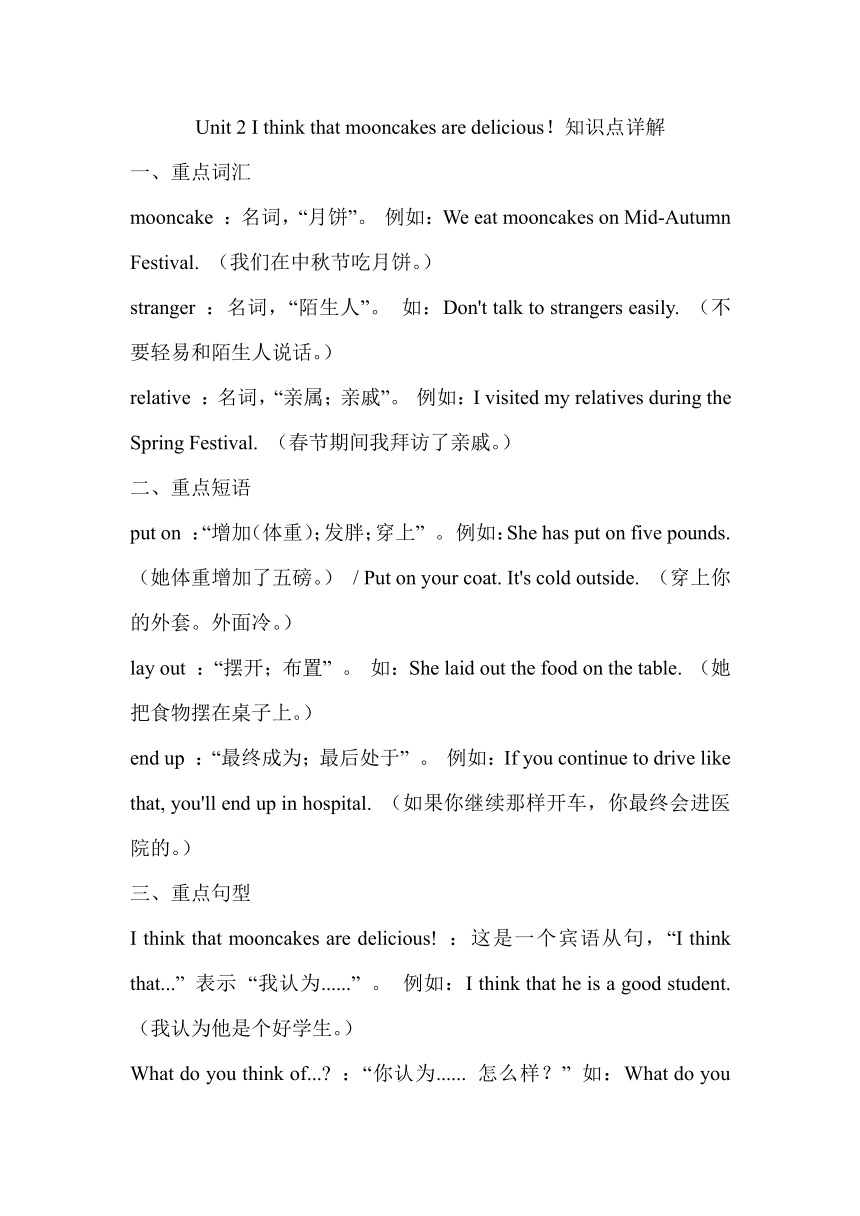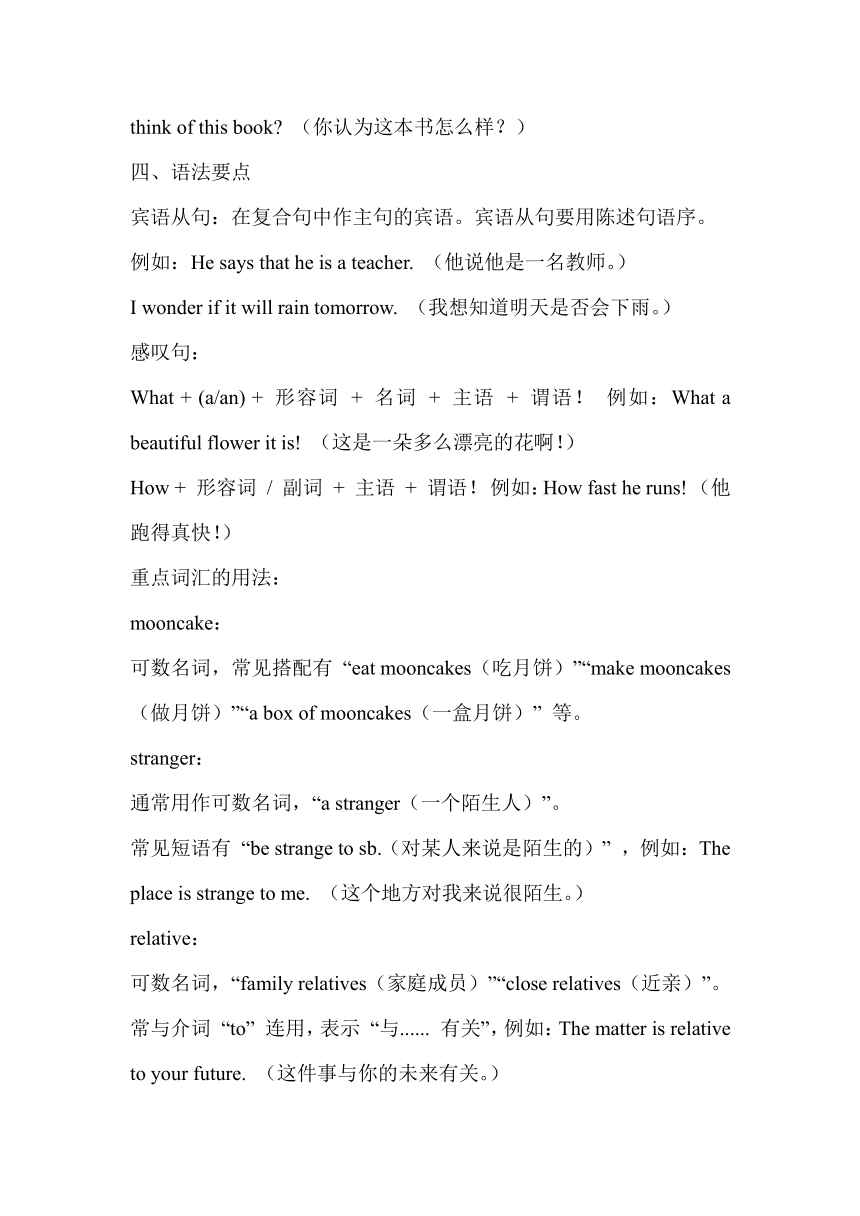Unit 2 I think that mooncakes are delicious!知识点详解 2024-2025学年人教版九年级英语全册
文档属性
| 名称 | Unit 2 I think that mooncakes are delicious!知识点详解 2024-2025学年人教版九年级英语全册 |  | |
| 格式 | docx | ||
| 文件大小 | 18.9KB | ||
| 资源类型 | 教案 | ||
| 版本资源 | 人教新目标(Go for it)版 | ||
| 科目 | 英语 | ||
| 更新时间 | 2024-08-17 10:07:00 | ||
图片预览


文档简介
Unit 2 I think that mooncakes are delicious!知识点详解
一、重点词汇
mooncake :名词,“月饼”。 例如:We eat mooncakes on Mid-Autumn Festival. (我们在中秋节吃月饼。)
stranger :名词,“陌生人”。 如:Don't talk to strangers easily. (不要轻易和陌生人说话。)
relative :名词,“亲属;亲戚”。 例如:I visited my relatives during the Spring Festival. (春节期间我拜访了亲戚。)
二、重点短语
put on :“增加(体重);发胖;穿上” 。 例如:She has put on five pounds. (她体重增加了五磅。) / Put on your coat. It's cold outside. (穿上你的外套。外面冷。)
lay out :“摆开;布置” 。 如:She laid out the food on the table. (她把食物摆在桌子上。)
end up :“最终成为;最后处于” 。 例如:If you continue to drive like that, you'll end up in hospital. (如果你继续那样开车,你最终会进医院的。)
三、重点句型
I think that mooncakes are delicious! :这是一个宾语从句,“I think that...” 表示 “我认为......” 。 例如:I think that he is a good student. (我认为他是个好学生。)
What do you think of... :“你认为...... 怎么样?” 如:What do you think of this book (你认为这本书怎么样?)
四、语法要点
宾语从句:在复合句中作主句的宾语。宾语从句要用陈述句语序。
例如:He says that he is a teacher. (他说他是一名教师。)
I wonder if it will rain tomorrow. (我想知道明天是否会下雨。)
感叹句:
What + (a/an) + 形容词 + 名词 + 主语 + 谓语! 例如:What a beautiful flower it is! (这是一朵多么漂亮的花啊!)
How + 形容词 / 副词 + 主语 + 谓语! 例如:How fast he runs! (他跑得真快!)
重点词汇的用法:
mooncake:
可数名词,常见搭配有 “eat mooncakes(吃月饼)”“make mooncakes(做月饼)”“a box of mooncakes(一盒月饼)” 等。
stranger:
通常用作可数名词,“a stranger(一个陌生人)”。
常见短语有 “be strange to sb.(对某人来说是陌生的)” ,例如:The place is strange to me. (这个地方对我来说很陌生。)
relative:
可数名词,“family relatives(家庭成员)”“close relatives(近亲)”。
常与介词 “to” 连用,表示 “与...... 有关”,例如:The matter is relative to your future. (这件事与你的未来有关。)
put on:
作 “穿上;戴上” 讲时,强调动作,反义词组是 “take off(脱下)”。例如:Put on your coat. It's cold outside. (穿上你的外套。外面冷。)
作 “增加(体重、速度等)” 讲时,例如:He has put on five kilograms. (他体重增加了五公斤。)
lay out:
意为 “摆开;布置”,是动词短语。例如:The workers laid out the tools neatly. (工人们把工具整齐地摆放出来。)
end up:
作 “最终成为;最后处于” 讲,常与 “with” 或 “doing sth.” 连用。例如:If you don't work hard, you'll end up with nothing. (如果你不努力工作,你最终将一无所获。)
They ended up doing a lot of work. (他们最后做了很多工作。)
部分单词的举例:
mooncake:
We made mooncakes by ourselves last Mid-Autumn Festival. (去年中秋节我们自己做了月饼。)
There are many kinds of mooncakes in the supermarket. (超市里有很多种月饼。)
stranger:
A stranger asked me the way to the train station. (一个陌生人向我问去火车站的路。)
Don't trust strangers easily in the street. (在街上不要轻易相信陌生人。)
relative:
I have many relatives in my hometown. (在我的家乡我有很多亲戚。)
We often visit our relatives during the holidays. (我们在假期经常拜访亲戚。)
put on:
She put on her new dress and went to the party. (她穿上新裙子去参加聚会了。)
You should put on more clothes. It's cold. (你应该多穿点衣服。天气冷。)
lay out:
They laid out the fruits and snacks on the table. (他们把水果和零食摆在桌子上。)
The shopkeeper laid out the goods neatly. (店主把商品整齐地摆放出来。)
end up:
If you keep eating so much, you'll end up getting fat. (如果你一直吃这么多,你最终会变胖的。)
They ended up as good friends. (他们最终成为了好朋友。)
一、重点词汇
mooncake :名词,“月饼”。 例如:We eat mooncakes on Mid-Autumn Festival. (我们在中秋节吃月饼。)
stranger :名词,“陌生人”。 如:Don't talk to strangers easily. (不要轻易和陌生人说话。)
relative :名词,“亲属;亲戚”。 例如:I visited my relatives during the Spring Festival. (春节期间我拜访了亲戚。)
二、重点短语
put on :“增加(体重);发胖;穿上” 。 例如:She has put on five pounds. (她体重增加了五磅。) / Put on your coat. It's cold outside. (穿上你的外套。外面冷。)
lay out :“摆开;布置” 。 如:She laid out the food on the table. (她把食物摆在桌子上。)
end up :“最终成为;最后处于” 。 例如:If you continue to drive like that, you'll end up in hospital. (如果你继续那样开车,你最终会进医院的。)
三、重点句型
I think that mooncakes are delicious! :这是一个宾语从句,“I think that...” 表示 “我认为......” 。 例如:I think that he is a good student. (我认为他是个好学生。)
What do you think of... :“你认为...... 怎么样?” 如:What do you think of this book (你认为这本书怎么样?)
四、语法要点
宾语从句:在复合句中作主句的宾语。宾语从句要用陈述句语序。
例如:He says that he is a teacher. (他说他是一名教师。)
I wonder if it will rain tomorrow. (我想知道明天是否会下雨。)
感叹句:
What + (a/an) + 形容词 + 名词 + 主语 + 谓语! 例如:What a beautiful flower it is! (这是一朵多么漂亮的花啊!)
How + 形容词 / 副词 + 主语 + 谓语! 例如:How fast he runs! (他跑得真快!)
重点词汇的用法:
mooncake:
可数名词,常见搭配有 “eat mooncakes(吃月饼)”“make mooncakes(做月饼)”“a box of mooncakes(一盒月饼)” 等。
stranger:
通常用作可数名词,“a stranger(一个陌生人)”。
常见短语有 “be strange to sb.(对某人来说是陌生的)” ,例如:The place is strange to me. (这个地方对我来说很陌生。)
relative:
可数名词,“family relatives(家庭成员)”“close relatives(近亲)”。
常与介词 “to” 连用,表示 “与...... 有关”,例如:The matter is relative to your future. (这件事与你的未来有关。)
put on:
作 “穿上;戴上” 讲时,强调动作,反义词组是 “take off(脱下)”。例如:Put on your coat. It's cold outside. (穿上你的外套。外面冷。)
作 “增加(体重、速度等)” 讲时,例如:He has put on five kilograms. (他体重增加了五公斤。)
lay out:
意为 “摆开;布置”,是动词短语。例如:The workers laid out the tools neatly. (工人们把工具整齐地摆放出来。)
end up:
作 “最终成为;最后处于” 讲,常与 “with” 或 “doing sth.” 连用。例如:If you don't work hard, you'll end up with nothing. (如果你不努力工作,你最终将一无所获。)
They ended up doing a lot of work. (他们最后做了很多工作。)
部分单词的举例:
mooncake:
We made mooncakes by ourselves last Mid-Autumn Festival. (去年中秋节我们自己做了月饼。)
There are many kinds of mooncakes in the supermarket. (超市里有很多种月饼。)
stranger:
A stranger asked me the way to the train station. (一个陌生人向我问去火车站的路。)
Don't trust strangers easily in the street. (在街上不要轻易相信陌生人。)
relative:
I have many relatives in my hometown. (在我的家乡我有很多亲戚。)
We often visit our relatives during the holidays. (我们在假期经常拜访亲戚。)
put on:
She put on her new dress and went to the party. (她穿上新裙子去参加聚会了。)
You should put on more clothes. It's cold. (你应该多穿点衣服。天气冷。)
lay out:
They laid out the fruits and snacks on the table. (他们把水果和零食摆在桌子上。)
The shopkeeper laid out the goods neatly. (店主把商品整齐地摆放出来。)
end up:
If you keep eating so much, you'll end up getting fat. (如果你一直吃这么多,你最终会变胖的。)
They ended up as good friends. (他们最终成为了好朋友。)
同课章节目录
- Unit 1 How can we become good learners.
- Section A
- Section B
- Unit 2 I think that mooncakes are delicious!
- Section A
- Section B
- Unit 3 Could you please tell me where the restroom
- Section A
- Section B
- Unit 4 I used to be afraid of the dark.
- Section A
- Section B
- Unit 5 What are the shirts made of?
- Section A
- Section B
- Review of Units 1-5
- Unit 6 When was it invented?
- Section A
- Section B
- Unit 7 Teenagers should be allowed to choose their
- Section A
- Section B
- Unit 8 It must belong to Carla.
- Section A
- Section B
- Unit 9 I like music that I can dance to.
- Section A
- Section B
- Unit 10 You're supposed to shake hands.
- Section A
- Section B
- Review of Units 6-10
- Unit 11 Sad movies make me cry.
- Section A
- Section B
- Unit 12 Life is full of the unexpected
- Section A
- Section B
- Unit 13 We're trying to save the earth!
- Section A
- Section B
- Unit 14 I remember meeting all of you in Grade 7.
- Section A
- Section B
- Review of Units 11-14
